| Leader of the Australian Labor Party | |
|---|---|
| Member of | |
| Term length | No fixed term |
| Inaugural holder | Chris Watson |
| Formation | 20 May 1901 |
| Deputy | Richard Marles |
| Website | Anthony Albanese, Leader of the Australian Labor Party |
The leader of the Australian Labor Party is the highest political office within the federal Australian Labor Party (ALP). Leaders of the party are chosen from among the sitting members of the parliamentary caucus either by members alone or with a vote of the party’s rank-and-file membership. The current leader of the Labor Party, since 2019, is Anthony Albanese, who has served as the prime minister of Australia since 2022.[1] There have been 21 leaders since 1901 when Chris Watson was elected as the inaugural leader following the first federal election.
Every Australian state and territory has its own branch of the Australian Labor Party, which has its own leader elected from the party members of that jurisdiction.
Background
The federal Labor Caucus comprising the elected members of the Labor party in both Houses of the national Parliament is involved in the election of the federal parliamentary leaders from among its members. The leader has historically been a member of the House of Representatives. Caucus also has the power to dismiss a party leader in a process called a leadership spill. Until 2013, a spill vote could be called at any time and a simple majority of votes in Caucus was sufficient to remove a leader. Following the return of Kevin Rudd to the leadership of the ALP in 2013, he sought changes to the party's rules so that leadership spills would be more difficult to launch in future, including a requirement for 75% majority in Caucus for a leadership spill against a sitting Labor prime minister, or 60% against an opposition leader.[2] The changes also provided for equally weighted voting rights between Caucus and party rank and file members. These changes were adopted by Caucus in July 2013, which was not a change to the party's constitution[3] (and theoretically can be reverted by a simple majority in Caucus). At the October 2013 leadership spill Bill Shorten was the first leader elected under the new rules. Shorten received 55-43 votes in Caucus, which was sufficient to overcome his 40% support among party members.[4]
When the Labor Party is in government, the party leader becomes the Prime Minister and the deputy leader becomes the Deputy Prime Minister. If a Labor prime minister resigns or dies in office, the deputy leader becomes party leader and is sworn in as prime minister on an interim basis until a party successor is elected. This was the case upon the death in office of John Curtin on 5 July 1945. Frank Forde, the deputy party leader, was sworn in as interim prime minister until Ben Chifley was elected by Caucus as party leader on 13 July. If the leader is out of the country or is on leave, the deputy leader acts as party leader and prime minister, without being sworn into the office.
According to recent convention, the leader and deputy leader must be from different factions and from different states.[5] The leadership and deputy leadership have also been gender-balanced.
Federal leadership
Leader
The federal Leaders of the Australian Labor Party have been as follows (acting leaders indicated in italics):
| # | Leader (birth–death) |
Electorate | Term start | Term end | Time in office | Prime Minister (term) | ||
|---|---|---|---|---|---|---|---|---|
| 1 |  |
Chris Watson (1876–1953) |
Bland (1901–1906); South Sydney (1906–1910) |
20 May 1901 | 30 October 1907 | 6 years, 163 days | Barton 1901–1903 | |
| Deakin 1903–1904 | ||||||||
| Himself 1904 | ||||||||
| Reid 1904–1905 | ||||||||
| Deakin 1905–1908 | ||||||||
| 2 |  |
Andrew Fisher (1862–1928) |
Wide Bay | 30 October 1907 | 27 October 1915 | 7 years, 362 days | ||
| Himself 1908–1909 | ||||||||
| Deakin 1909–1910 | ||||||||
| Himself 1910–1913 | ||||||||
| Cook 1913–1914 | ||||||||
| Himself 1914–1915 | ||||||||
| 3 |  |
Billy Hughes (1862–1952) |
West Sydney | 27 October 1915 | 14 November 1916 | 1 year, 18 days | Himself 1915–1916 | |
| 4 |  |
Frank Tudor (1866–1922) |
Yarra | 14 November 1916 | 10 January 1922† | 5 years, 57 days | Hughes 1916–1917 | |
| Hughes 1917–1923 | ||||||||
| 5 |  |
Matthew Charlton (1866–1948) |
Hunter | 16 January 1922 | 16 May 1922 | 111 days | ||
| 16 May 1922 | 29 March 1928 | 5 years, 318 days | ||||||
| Bruce 1923–1929 | ||||||||
| 6 | 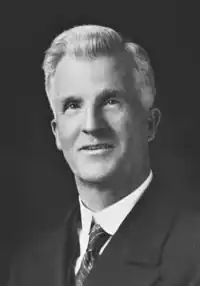 |
James Scullin (1876–1953) |
Yarra | 26 April 1928 | 1 October 1935 | 7 years, 128 days | ||
| Himself 1929–1932 | ||||||||
| Lyons 1932–1939 | ||||||||
| 7 |  |
John Curtin (1885–1945) |
Fremantle | 1 October 1935 | 5 July 1945† | 9 years, 277 days | ||
| Page 1939 | ||||||||
| Menzies 1939–1941 | ||||||||
| Fadden 1941 | ||||||||
| Himself 1941–1945 | ||||||||
| –[6] |  |
Frank Forde (1890–1983) |
Capricornia | 6 July 1945 | 13 July 1945 | 7 days | Himself 1945 | |
| 8 |  |
Ben Chifley (1885–1951) |
Macquarie | 13 July 1945 | 13 June 1951† | 5 years, 335 days | Himself 1945–1949 | |
| Menzies 1949–1966 | ||||||||
| 9 |  |
H. V. Evatt (1894–1965) |
Barton (1940–1958); Hunter (1958–1960) |
20 June 1951 | 9 February 1960 | 8 years, 241 days | ||
| 10 | 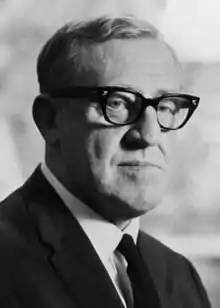 |
Arthur Calwell (1896–1973) |
Melbourne | 7 March 1960 | 8 February 1967 | 6 years, 338 days | ||
| Holt 1966–1967 | ||||||||
| 11 | .jpg.webp) |
Gough Whitlam (1916–2014) |
Werriwa | 9 February 1967 | 22 December 1977 | 10 years, 316 days | ||
| McEwen 1967–1968 | ||||||||
| Gorton 1968–1971 | ||||||||
| McMahon 1971–1972 | ||||||||
| Himself 1972–1975 | ||||||||
| Fraser 1975–1983 | ||||||||
| 12 | .jpg.webp) |
Bill Hayden (1933-2023) |
Oxley | 22 December 1977 | 8 February 1983 | 5 years, 48 days | ||
| 13 | 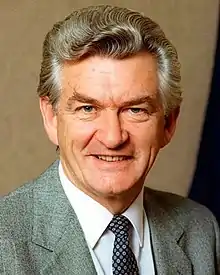 |
Bob Hawke (1929–2019) |
Wills | 8 February 1983 | 19 December 1991 | 8 years, 314 days | ||
| Himself 1983–1991 | ||||||||
| 14 | 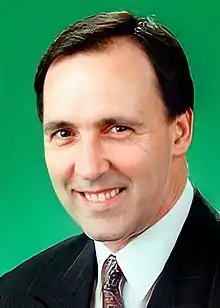 |
Paul Keating (b. 1944) |
Blaxland | 19 December 1991 | 19 March 1996 | 4 years, 91 days | Himself 1991–1996 | |
| 15 |  |
Kim Beazley (b. 1948) |
Brand | 19 March 1996 | 22 November 2001 | 5 years, 248 days | Howard 1996–2007 | |
| 16 |  |
Simon Crean (1949–2023) |
Hotham | 22 November 2001 | 2 December 2003 | 2 years, 10 days | ||
| 17 |  |
Mark Latham (b. 1961) |
Werriwa | 2 December 2003 | 18 January 2005 | 1 year, 47 days | ||
| (15) |  |
Kim Beazley (b. 1948) |
Brand | 18 January 2005 | 4 December 2006 | 1 year, 320 days | ||
| 18 | 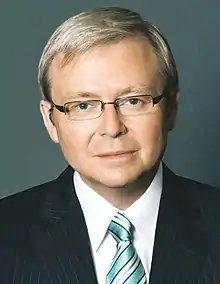 |
Kevin Rudd (b. 1957) |
Griffith | 4 December 2006 | 24 June 2010 | 3 years, 202 days | ||
| Himself 2007–2010 | ||||||||
| 19 |  |
Julia Gillard (b. 1961) |
Lalor | 24 June 2010 | 26 June 2013 | 3 years, 2 days | Herself 2010–2013 | |
| (18) | 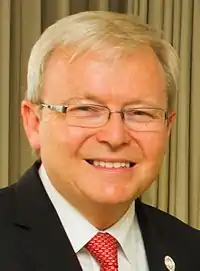 |
Kevin Rudd (b. 1957) |
Griffith | 26 June 2013 | 13 September 2013 | 79 days | Himself 2013 | |
| – |  |
Chris Bowen (b. 1973) |
McMahon | 18 September 2013 | 13 October 2013 | 25 days | Abbott 2013–2015 | |
| 20 |  |
Bill Shorten (b. 1967) |
Maribyrnong | 13 October 2013 | 30 May 2019 | 5 years, 229 days | ||
| Turnbull 2015–2018 | ||||||||
| Morrison 2018–2022 | ||||||||
| 21 | .jpg.webp) |
Anthony Albanese (b. 1963) |
Grayndler | 30 May 2019 | Incumbent | 4 years, 230 days | ||
| Himself 2022–present | ||||||||
Deputy Leader
- Shown in chronological order of leadership
| # | Deputy Leader | Term start | Term end | Time in office | Leader | |
|---|---|---|---|---|---|---|
| 1 |  |
Gregor McGregor | 20 May 1901 | 30 July 1914 | 13 years, 71 days | Chris Watson |
| Andrew Fisher | ||||||
| 2 |  |
Billy Hughes | 18 September 1914 | 27 October 1915 | 1 year, 39 days | |
| 3 | 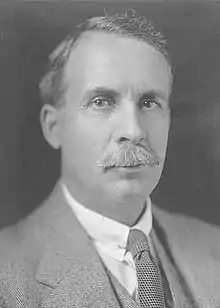 |
George Pearce | 27 October 1915 | 14 November 1916 | 1 year, 18 days | Billy Hughes |
| 4 |  |
Albert Gardiner[lower-alpha 1] | 14 November 1916 | 30 June 1926 | 9 years, 228 days | Frank Tudor |
| Matthew Charlton | ||||||
| 5 | 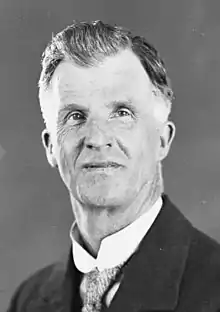 |
James Scullin | 17 March 1927 | 29 March 1928 | 1 year, 12 days | |
| 6 |  |
Arthur Blakeley | 26 April 1928 | 5 February 1929 | 285 days | James Scullin |
| 7 |  |
Ted Theodore | 5 February 1929 | 19 December 1931 | 2 years, 317 days | |
| 8 | 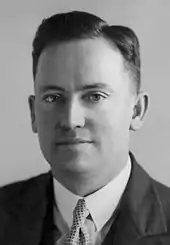 |
Frank Forde | 16 February 1932 | 28 September 1946 | 14 years, 224 days | |
| John Curtin | ||||||
| Ben Chifley | ||||||
| 9 |  |
H. V. Evatt | 31 October 1946 | 20 June 1951 | 4 years, 232 days | |
| 10 |  |
Arthur Calwell | 20 June 1951 | 7 March 1960 | 8 years, 261 days | H. V. Evatt |
| 11 |  |
Gough Whitlam | 7 March 1960 | 9 February 1967 | 6 years, 339 days | Arthur Calwell |
| 12 | .jpg.webp) |
Lance Barnard | 9 February 1967 | 12 June 1974 | 7 years, 123 days | Gough Whitlam |
| 13 | 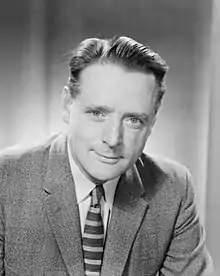 |
Jim Cairns | 12 June 1974 | 2 July 1975 | 1 year, 20 days | |
| 14 | 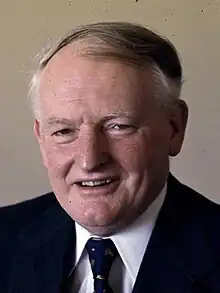 |
Frank Crean | 2 July 1975 | 22 December 1975 | 173 days | |
| 15 | .jpg.webp) |
Tom Uren | 22 December 1975 | 22 December 1977 | 2 years, 0 days | |
| 16 | 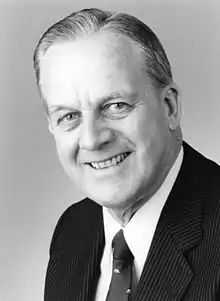 |
Lionel Bowen | 22 December 1977 | 4 April 1990 | 12 years, 103 days | Bill Hayden |
| Bob Hawke | ||||||
| 17 |  |
Paul Keating | 4 April 1990 | 3 Jun 1991 | 1 year, 60 days | |
| 18 | .jpg.webp) |
Brian Howe | 3 June 1991 | 20 June 1995 | 4 years, 17 days | |
| Paul Keating | ||||||
| 19 |  |
Kim Beazley | 20 June 1995 | 19 March 1996 | 273 days | |
| 20 |  |
Gareth Evans | 19 March 1996 | 19 October 1998 | 2 years, 214 days | Kim Beazley |
| 21 |  |
Simon Crean | 19 October 1998 | 22 November 2001 | 3 years, 34 days | |
| 22 | .jpg.webp) |
Jenny Macklin | 22 November 2001 | 4 December 2006 | 5 years, 12 days | Simon Crean |
| Mark Latham | ||||||
| Kim Beazley | ||||||
| 23 |  |
Julia Gillard | 4 December 2006 | 24 June 2010 | 3 years, 202 days | Kevin Rudd |
| 24 |  |
Wayne Swan | 24 June 2010 | 27 June 2013 | 3 years, 3 days | Julia Gillard |
| 25 |  |
Anthony Albanese | 27 June 2013 | 14 October 2013 | 109 days | Kevin Rudd |
| 26 | 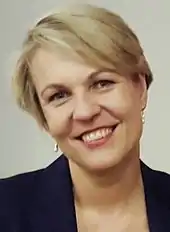 |
Tanya Plibersek | 14 October 2013 | 30 May 2019 | 5 years, 228 days | Bill Shorten |
| 27 | 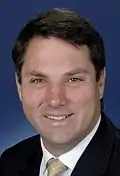 |
Richard Marles | 30 May 2019 | Incumbent | 4 years, 230 days | Anthony Albanese |
- Notes
- ↑ As Gardiner was a member of the Senate, the party also elected a deputy leader or assistant leader in the House of Representatives. T. J. Ryan was elected assistant leader on 9 September 1920.[7] After Ryan died in office in 1 August 1921, Matthew Charlton was elected as the new deputy leader on 29 September 1921.[8] Charlton was elected leader of the ALP in the House of Representatives on 25 January 1922, following the death of Frank Tudor two weeks earlier.[9] Frank Anstey was elected deputy leader to Charlton on 16 May 1922.[10]
Senate Leader
| # | Senate Leader | Term start | Term end | Time in office | Leader(s) | |
|---|---|---|---|---|---|---|
| 1 |  |
Gregor McGregor | 20 May 1901 | 13 August 1914 | 13 years, 85 days | Watson Fisher |
| 2 | .jpg.webp) |
George Pearce | 17 September 1914 | 14 November 1916 | 2 years, 58 days | Fisher Hughes |
| 3 |  |
Albert Gardiner | 14 November 1916 | 30 June 1926 | 9 years, 228 days | Tudor Charlton |
| 4 |  |
Ted Needham | 9 July 1926 | 25 June 1929 | 2 years, 351 days | Charlton Scullin |
| 5 | 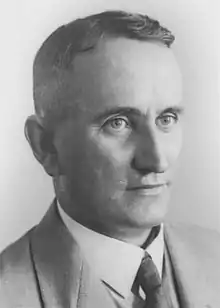 |
John Daly | 25 June 1929 | 3 March 1931 | 1 year, 251 days | Scullin |
| 6 |  |
John Barnes | 25 June 1929 | 30 June 1935 | 6 years, 5 days | Scullin |
| 7 |  |
Joe Collings | 30 June 1935 | 20 September 1943 | 8 years, 82 days | Scullin Curtin |
| 8 |  |
Richard Keane | 20 September 1943 | 26 April 1946 | 2 years, 218 days | Curtin Chifley |
| 9 | 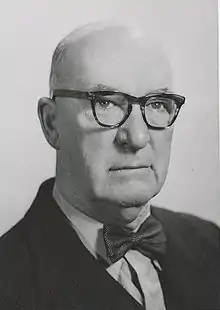 |
Bill Ashley | 17 June 1946 | 11 June 1951 | 4 years, 359 days | Chifley |
| 10 |  |
Nick McKenna | 11 June 1951 | 17 Aug 1966 | 15 years, 67 days | Chifley Evatt Calwell |
| 11 | .jpg.webp) |
Don Willesee | 17 August 1966 | 8 February 1967 | 175 days | Calwell |
| 12 | .jpg.webp) |
Lionel Murphy | 8 February 1967 | 9 February 1975 | 8 years, 1 day | Whitlam |
| 13 | .jpg.webp) |
Ken Wriedt | 10 February 1975 | 25 September 1980 | 5 years, 228 days | Whitlam Hayden |
| 14 | John Button | 7 November 1980 | 24 March 1993 | 12 years, 137 days | Hayden Hawke Keating | |
| 15 |  |
Gareth Evans | 24 March 1993 | 6 February 1996 | 2 years, 319 days | Keating |
| 16 |  |
John Faulkner | 19 March 1996 | 22 October 2004 | 8 years, 217 days | Beazley Crean Latham |
| 17 | 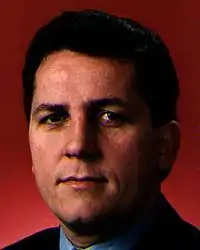 |
Chris Evans | 22 October 2004 | 4 February 2013 | 8 years, 103 days | Latham Beazley Rudd Gillard |
| 18 |  |
Stephen Conroy | 4 February 2013 | 26 June 2013 | 142 days | Gillard |
| 19 |  |
Penny Wong | 26 June 2013 | Incumbent | 10 years, 203 days | Rudd Shorten Albanese |
State and territory leadership
Australian Capital Territory
- Rosemary Follett (1989, 1991–1995, inaugural Chief Minister of the ACT, and first female head of government of an Australian state or territory)
- Jon Stanhope (2001–2011)
- Katy Gallagher (2011–2014)
- Andrew Barr (2014-)
New South Wales
- James McGowen (1910–1913)
- William Holman (1913–1916)
- John Storey (1920–21)
- James Dooley (1921, 1921–22)
- Jack Lang (1925–1927, 1930–1932)
- William McKell (1941–1947)
- James McGirr (1947–1952)
- Joseph Cahill (1952–1959)
- Bob Heffron (1959–1964)
- Jack Renshaw (1964–65)
- Neville Wran (1976–1986)
- Barrie Unsworth (1986–1988)
- Bob Carr (1995–2005)
- Morris Iemma (2005–2008)
- Nathan Rees (2008–09)
- Kristina Keneally (2009–2011, first female premier of New South Wales)
- Chris Minns (2023-)
Northern Territory
- Clare Martin (2001–2007, first Labor Chief Minister of the Northern Territory, first female Chief Minister of the Northern Territory)
- Paul Henderson (2007–2012)
- Michael Gunner (2016-2022)
- Natasha Fyles (2022-)
Queensland
- Anderson Dawson (1899, world's first leader of a parliamentary socialist government)
- T. J. Ryan (1915–1919)
- Ted Theodore (1919–1925)
- William Gillies (1925)
- William McCormack (1925–1929)
- William Forgan Smith (1932–1942)
- Frank Cooper (1942–1946)
- Ned Hanlon (1946–1952)
- Vince Gair (1952–1957)
- Wayne Goss (1989–1996)
- Peter Beattie (1998–2007)
- Anna Bligh (2007–2012, first female premier of Queensland, and first woman in Australia to win an election as premier)
- Annastacia Palaszczuk (2015-)
South Australia
- Thomas Price (1905–1909)
- John Verran (1910–1912)
- Crawford Vaughan (1915–1917)
- John Gunn (1924–1926)
- Lionel Hill (1926–27, 1930–1933)
- Robert Richards (1933)
- Frank Walsh (1965–1967)
- Don Dunstan (1967–68, 1970–1979)
- Des Corcoran (1979)
- John Bannon (1982–1992)
- Lynn Arnold (1992–93)
- Mike Rann (2002–2011)
- Jay Weatherill (2011–2018)
- Peter Malinauskas (2022-)
Tasmania
- John Earle (1909, 1914–1916)
- Joseph Lyons (1923–1928)
- Albert Ogilvie (1934–1939)
- Edmund Dwyer-Gray (1939)
- Robert Cosgrove (1939–1947, 1948–1958)
- Edward Brooker (1947–48)
- Eric Reece (1958–1969, 1972–1975)
- Bill Neilson (1975–1977)
- Doug Lowe (1977–1981)
- Harry Holgate (1981–82)
- Michael Field (1989–1992)
- Jim Bacon (1998–2004)
- Paul Lennon (2004–2008)
- David Bartlett (2008–2011)
- Lara Giddings (2011–2014, first female Premier of Tasmania)
Victoria
- George Elmslie (1913)
- George Prendergast (1924)
- Edmond Hogan (1927–28, 1929–1932)
- John Cain (34th Premier of Victoria) (1943, 1945–1947, 1952–1955)
- John Cain (41st Premier of Victoria) (1982–1990)
- Joan Kirner (1990–1992, first female premier of Victoria)
- Steve Bracks (1999–2007)
- John Brumby (2007–2010)
- Daniel Andrews (2014-2023)
- Jacinta Allan (2023-)
Western Australia
- Henry Daglish (1904–05)
- John Scaddan (1911–1916)
- Philip Collier (1924–1930, 1933–1936)
- John Willcock (1936–1945)
- Frank Wise (1945–1947)
- Albert Hawke (1953–1959)
- John Tonkin (1971–1974)
- Brian Burke (1983–1988)
- Peter Dowding (1988–1990)
- Carmen Lawrence (1990–1993, first female premier of an Australian state)
- Geoff Gallop (2001–2006)
- Alan Carpenter (2006–2008)
- Mark McGowan (2017-2023)
- Roger Cook (2023-)
References
- ↑ Wu, David (22 May 2022). "Five Labor MPs to be immediately sworn in ahead of key Quad trip". Sky News Australia. Archived from the original on 31 May 2022. Retrieved 23 May 2022.
- ↑ "Rudd reveals plan for Labor leadership voting reform". ABC News. 8 July 2013.
- ↑ Kevin Rudd wins over party-p leadership-p rules
- ↑ Harrison, Bill (13 October 2013). "Bill Shorten elected Labor leader". The Sydney Morning Herald. Retrieved 19 July 2014.
- ↑ "Plibersek says she can't reconcile family responsibilities with leadership". ABC News. 20 May 2019. Retrieved 12 October 2023.
- ↑ Prime Ministers of Australia: Frank Forde. National Museum of Australia. Retrieved 22 August 2018.
- ↑ "Mr Ryan: Assistant Leader, Federal Labour Party". The Sydney Morning Herald. 10 September 1920.
- ↑ "Mr. Tudor asked to continue". The Age. Melbourne. 30 September 1921.
- ↑ "MR. CHARLTON LEADER IN THE HOUSE". The Sydney Morning Herald. 26 January 1922.
- ↑ "Federal Labor Party: Executive Officers Appointed". Geelong Advertiser. 17 May 1922.